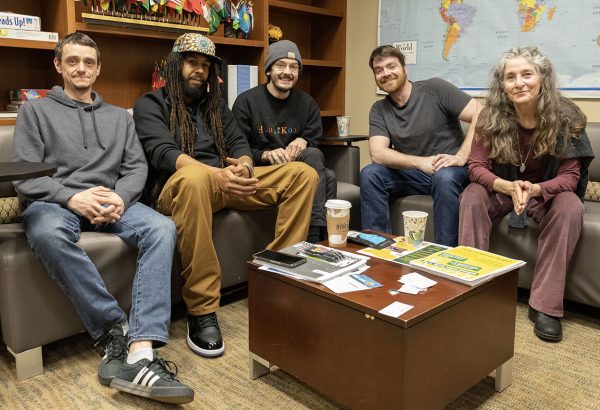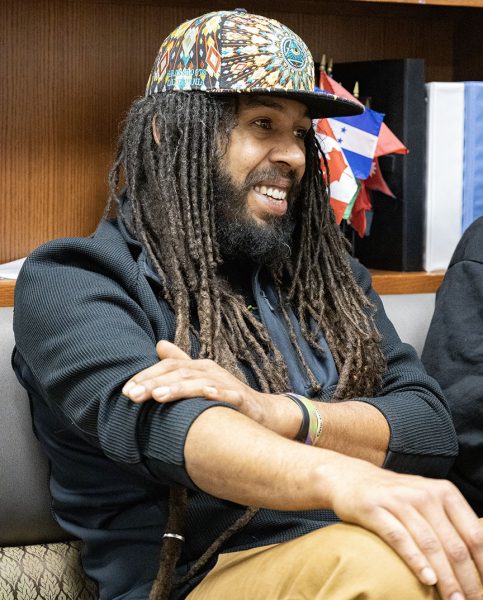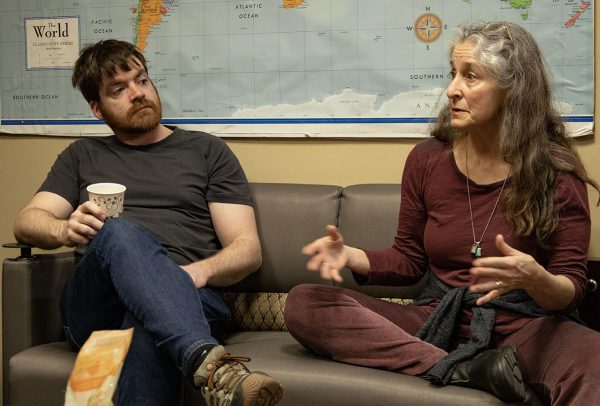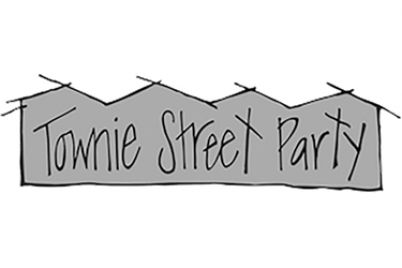
WCC’s Collegiate Recovery Program (CRP) holds a business meeting. Paula Farmer | Washtenaw Voice
by Robin Wyllie-Scholz
Deputy Editor
Walking into the International Student Center, the sight of flags from around the globe is to be expected. One flag is larger than the rest, however, and belongs not to a faraway country but something much closer to home – the Collegiate Recovery Program (CRP). CRP’s flag, a bright yellowish-green, rests in the corner of the room that hosts not only international students, but CRP meetings as well. The group, founded in 2019, provides support for students who want to change their relationship with substances, like alcohol or opioids.
The opioid crisis has been a major public health concern since the ‘90s, according to the Harvard School of Public Health, and is only getting worse.
Opioid-related deaths in Washtenaw County rose from 61 to 78 – a 28% increase – from 2020 to 2021, according to the Washtenaw County Health Department.
Continued lack of social interaction caused by the pandemic was a major factor in this spike, according to Mario Nanos, co-founder of Washtenaw Families Against Narcotics.
“One of the primary predictors of relapse is isolation,” Nanos said.
The loneliness of quarantine was hard for many people. Global rates of depression and anxiety jumped up by 25% in the first year of the pandemic, according to a report by the World Health Organization.
Issues with mental health and substance use can often go hand-in-hand.
“People use for physical pain and for mental pain too,” said Matt Strang, CRP Officer and peer educator.
Strang experienced this in his own struggle with Substance Use Disorder (SUD). For him, “the depression was always leading to the substance use.”
Recovery looks differently for everyone. Strang found a surprising source of relief– psilocybin, the chemical compound that gives magic mushrooms their hallucinogenic properties. Strang tried microdosing psilocybin, and “two days later [he] wasn’t depressed anymore”.
Though it may sound like a miracle cure, the effects of psilocybin are still in question. While some studies have found positive results for people microdosing psilocybin, like one published in Scientific Reports that found psilocybin microdosing led to improved mood, other studies have found mixed or negative results. A study for Translational Psychiatry found some positive “subjective effects”, but no objective evidence that psilocybin microdosing caused “enhanced well-being, creativity and cognitive function”.
Recovery is not one-size fits all. CRP stresses meeting people where they’re at and supporting individual choice. If someone is uncomfortable with a certain path of care, it probably won’t help them.
“You can’t force people into treatment. It just doesn’t work,” said Strang.
Having options is crucial for someone beginning their journey with recovery. It’s important to “keep choice and what people are willing to do in the center,” said CRP coordinator and health educator Teresa Herzog.
Decriminalization and increased societal support for people struggling with substance use are two important pillars of CRP’s mission. Washtenaw County decriminalized psilocybin in 2021, making it a more accessible treatment option. Decriminalization of opioid use would make it easier to get help without having to worry about legal repercussions.
“That fear can stop people from getting care,” said Herzog.
Addressing the systemic issues that lead people to substance use, like poverty and difficulty accessing healthcare, is also crucial. Rising housing costs means that there are people who “can’t afford to live in this community where they go to school,” said Herzog. “[That could] cause anyone’s mental health to plummet”.
A lack of societal support and access to care puts many people in a very difficult spot, and this can lead to substance use.
“People are dying because they don’t feel that there’s another option but to use,” said CRP Officer and peer educator Cornelius “Corn” Williams. Though things are bleak right now, Williams is hopeful. He came back to school after getting a bachelor’s because he believes in the progress that is being made.

Cornelius “Corn” Williams smiles during a CRP meeting. Paula Farmer | Washtenaw Voice
“The idea that I could participate in this movement… was motivation enough to come back [to school],” Williams said.
Williams and the rest of CRP believe that Washtenaw County and the state of Michigan are poised to be at the forefront of this change.
“We’re gonna be a state where people from across the country can come and get treatment,” said Williams.
CRP holds weekly recovery meetings Thursdays from 4-5 p.m. in LA 229. CRP Officer and peer educator Scott Hughes stressed that the meetings are open to all.
“If you’re a human, you’re welcome,” Hughes said.

Scott Hughes and Teresa Herzog discuss barriers to getting help in a CRP meeting. Paula Farmer | Washtenaw Voice


